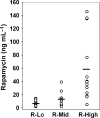Rapamycin slows aging in mice
- PMID: 22587563
- PMCID: PMC3434687
- DOI: 10.1111/j.1474-9726.2012.00832.x
Rapamycin slows aging in mice
Abstract
Rapamycin increases lifespan in mice, but whether this represents merely inhibition of lethal neoplastic diseases, or an overall slowing in multiple aspects of aging is currently unclear. We report here that many forms of age-dependent change, including alterations in heart, liver, adrenal glands, endometrium, and tendon, as well as age-dependent decline in spontaneous activity, occur more slowly in rapamycin-treated mice, suggesting strongly that rapamycin retards multiple aspects of aging in mice, in addition to any beneficial effects it may have on neoplastic disease. We also note, however, that mice treated with rapamycin starting at 9 months of age have significantly higher incidence of testicular degeneration and cataracts; harmful effects of this kind will guide further studies on timing, dosage, and tissue-specific actions of rapamycin relevant to the development of clinically useful inhibitors of TOR action.
© 2012 The Authors. Aging Cell © 2012 Blackwell Publishing Ltd/Anatomical Society of Great Britain and Ireland.
Figures







References
-
- Anisimov VN, Zabezhinski MA, Popovich IG, Piskunova TS, Semenchenko AV, Tyndyk ML, Yurova MN, Rosenfeld SV, Blagosklonny MV. Rapamycin increases lifespan and inhibits spontaneous tumorigenesis in inbred female mice. Cell Cycle. 2011;10:12–15. - PubMed
-
- Blagosklonny MV. Aging and immortality: quasi-programmed senescence and its pharmacologic inhibition. Cell Cycle. 2006;5:2087–2102. - PubMed
Publication types
MeSH terms
Substances
Grants and funding
LinkOut - more resources
Full Text Sources
Other Literature Sources
Medical
Molecular Biology Databases

